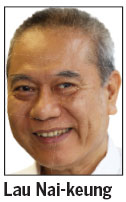Don't mix identity politics with identity analysis, please
Updated: 2013-06-25 05:43
By Lau Nai-keung(HK Edition)
|
|||||||
In an article published in Theory and Society in 2000 titled "Beyond 'Identity'", University of California academics Rogers Brubaker and Frederick Cooper argued that the social sciences and humanities have surrendered to the word "identity" with both intellectual and political costs. "Identity," they contend, "tends to mean too much (when understood in a strong sense), too little (when understood in a weak sense), or nothing at all (because of its sheer ambiguity)" and suggest the conceptual and theoretical work "identity" is supposed to do as a term might be done better by other terms that are "less ambiguous, and unencumbered by the reifying connotations of 'identity'".
Identity politics and identity as an analytical concept are not one and the same, but we often get confused because people like Robert Chung Ting-yiu are mixing them up.
Last week, the University of Hong Kong's Popular Opinion Programme announced poll results saying that Hong Kong peoples' "sense of Chinese identity" has fallen to a 14-year low. The survey also found nearly four in 10 respondents described themselves distinctly as "Hongkongers", a rise of 11 percentage points from last December. The news said the results "showed a cooling of sentiment towards the mainland in recent months".
The twice-yearly poll asked 1,055 Hong Kong people to rate how strongly they associated themselves with a range of identities - including Hongkongers, Chinese, Asians and "global citizens" - on a scale of 1 to 10. The results revealed that Hong Kong people's feeling is strongest as "Hongkongers", followed by "Asians", then "members of the Chinese nation", "Chinese", "global citizens", and finally, "citizens of the PRC".

Many patriots and officials are alarmed by these findings, and they interpret them as a sign that the "handover" of hearts and minds is not yet complete. However, in reality the findings have little political impact, no matter how the dissidents would like to frame them along the line of the narrative of "identity politics".
The only purpose these findings serve is to irritate Beijing and reaffirm some people's belief that Hong Kong is not ready for universal suffrage. In this regard they are effective, and therefore we are witnessing initiatives to reverse the sentiment.
There are various kinds of patriotic education, in the forms of mainland tours, exchanges, internships and workshops. And of course there also are calls for our Chief Executive and principal officials to promote patriotic thinking. When mainland-Hong Kong conflicts arise, they are supposed to tell all of us that loving China will ultimately do Hong Kong good. Then, there is the ongoing "Hong Kong: Our Home" campaign organized by the SAR government, but it might have the opposite effect of heightening our sense of "Hongkongness".
These efforts all point to the fact that the patriots have fallen into Robert Chung's trap. They are also mixing up the politics of identity with identity analysis. Opinion surveys objectify identity; they are fashionable because objectifying identity at this point of time is to the dissident's advantage. If we want to reverse the trend, we cannot use the same kind of tactics as the dissidents use with their "identity politics" - it is one thing to maintain hegemony, it is another to replace it with a new one.
The first thing we need to do is to look at the concept of "identity" not politically but analytically. That's how I understand Hao Tiechuan, director of publicity, culture and sports affairs at the Liaison Office of the Central People's Government in the HKSAR, and his criticism of these polls as "illogical" and "unscientific".
As Brubaker and Cooper remind us "(the) tendency to objectify 'identity' deprives us of analytical leverage. It makes it more difficult for us to treat 'groupness' and 'boundedness' as emergent properties of particular structural or conjunctural settings rather than as always already there in some form". We also need to look at the relationship between social structure and identity. In order words, we should study the interactions between objective reality and subjective reality.
If mere words would suffice, we will not be where we are today. If our collective interests are genuinely shared with 1.3 billion compatriots on the mainland, how can we reconcile this fact with our everyday experience - such as congestion, inflation, shop closures and rising real-estate prices? This is the real challenge.
The author is a member of the Commission on Strategic Development.
(HK Edition 06/25/2013 page9)